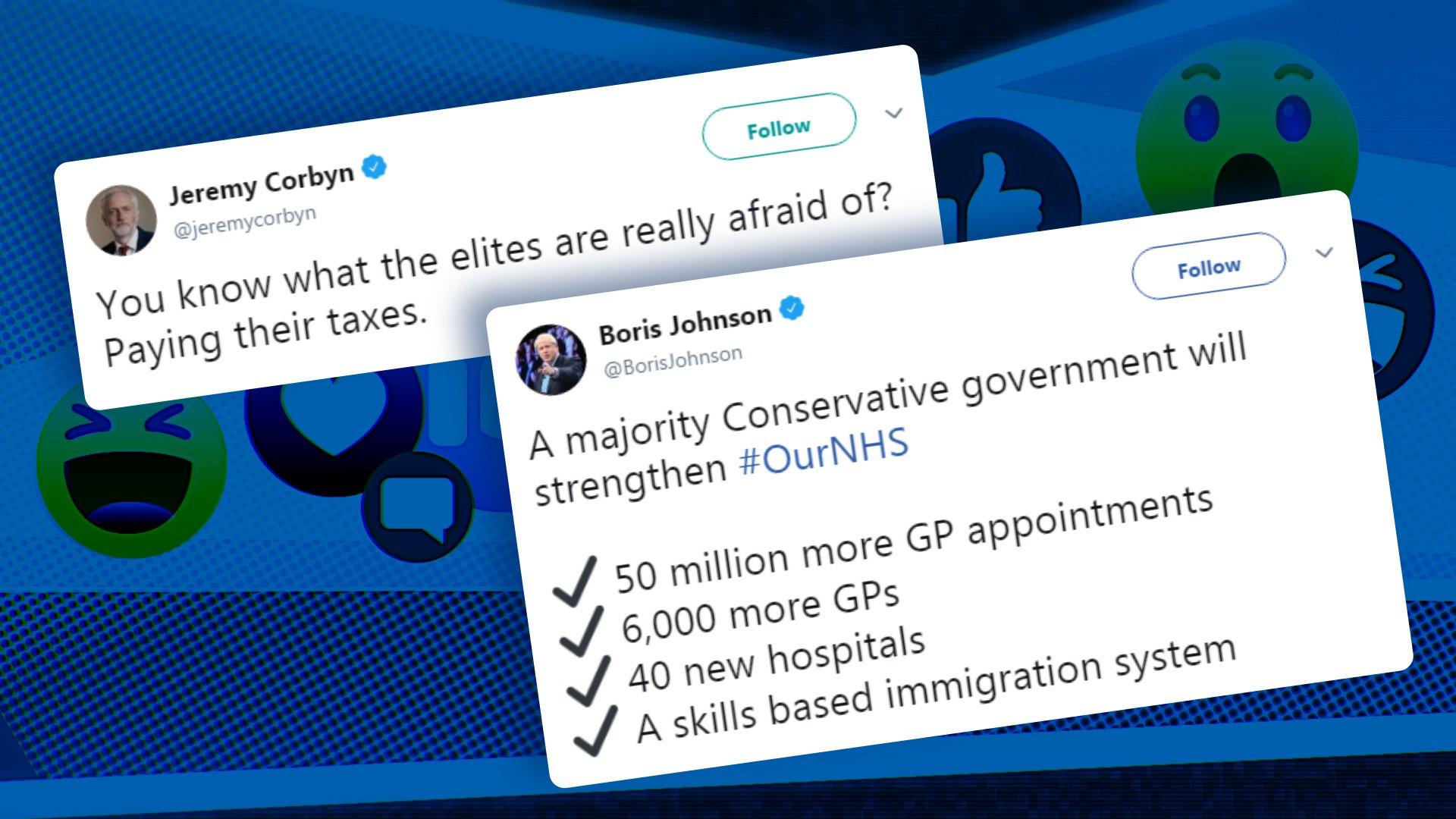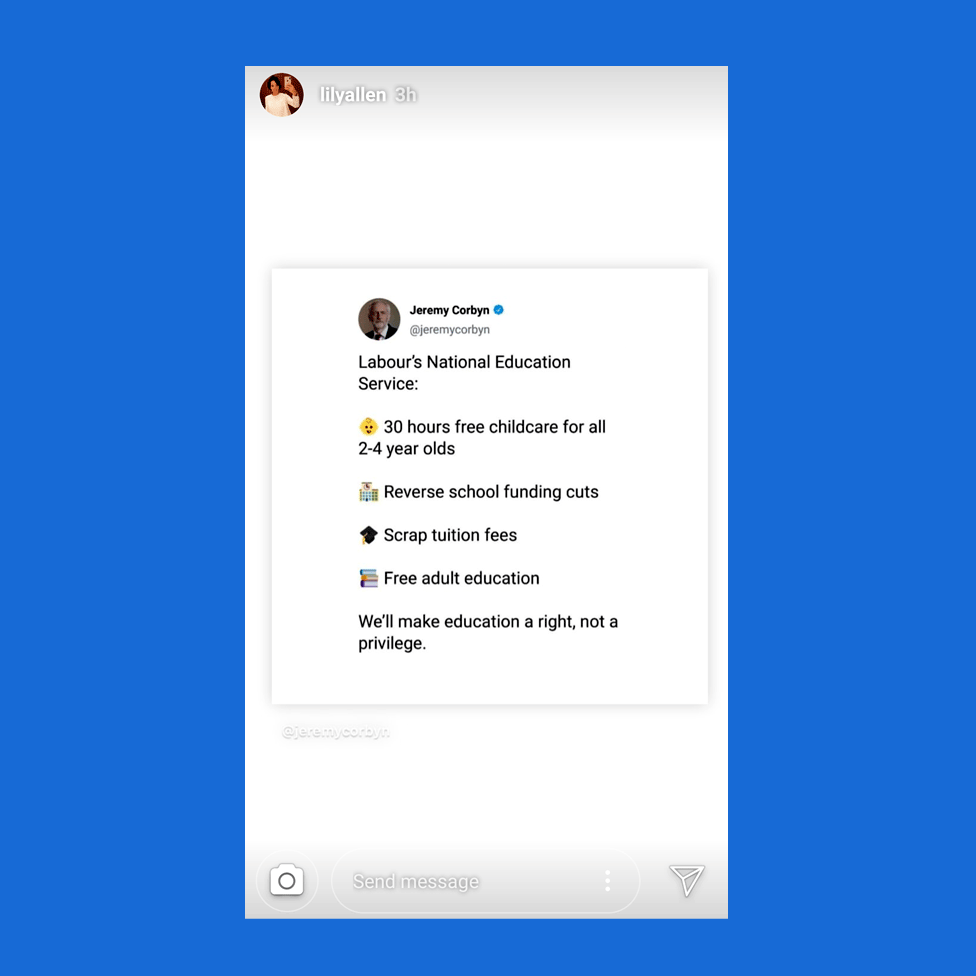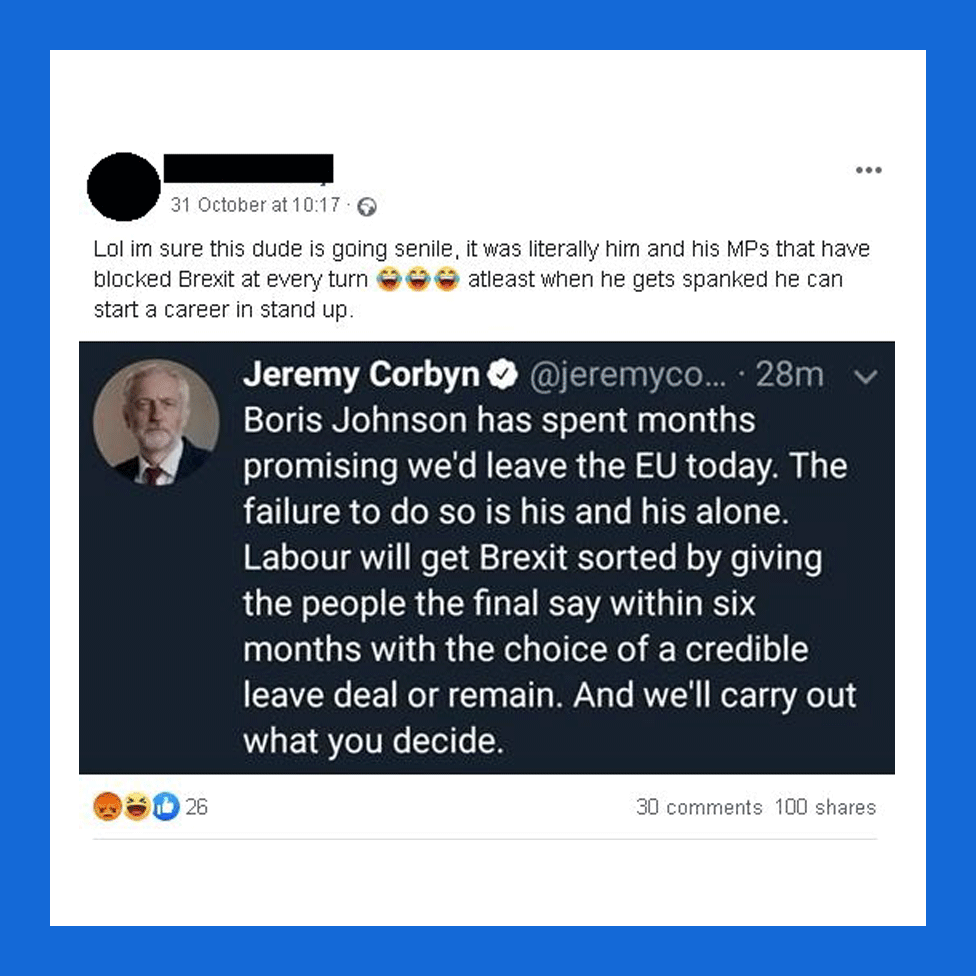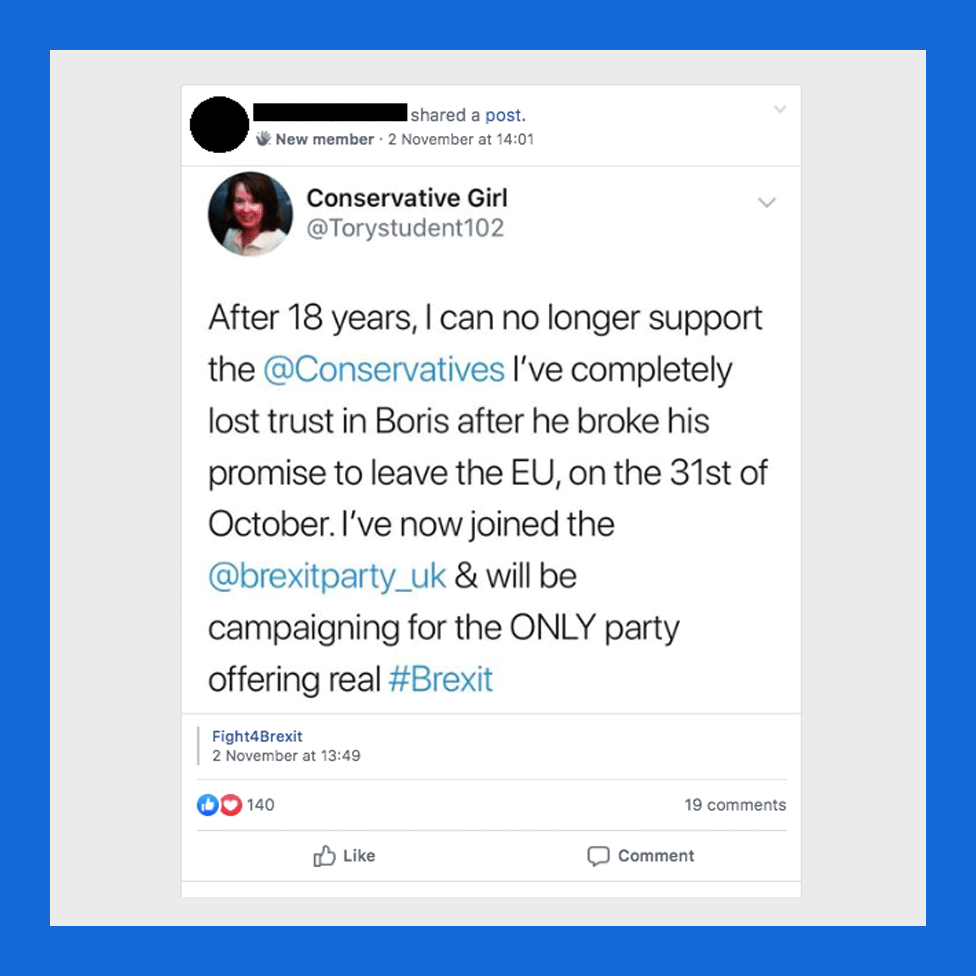General election 2019: Why social media is full of political Twitter screenshots
- Published

It might seem like a clunky way to get a message out. But as the UK gears up for an election on 12 December, social media is being flooded with screenshots of political tweets.
Twitter has fewer users than other big social media sites, but it frequently kick-starts conversations elsewhere when pictures of tweets get shared on Facebook, WhatsApp - or even singer Lily Allen's Instagram account.
And with conversations jumping between platforms, it's increasingly hard to measure who is winning the online race.
Twitter battle
Matt Walsh of Cardiff University compiled a list of the most-shared tweets of the election campaign as of last week - and it was dominated by Jeremy Corbyn. The Labour leader accounted for the seven most liked tweets and 13 of the top 14.
Evidence suggests that people who talk politics on Twitter are more likely to support Labour, external than the population at large, while Facebook users are thought to be more evenly distributed, external along the political spectrum.
One tweet by Mr Corbyn about economic equality was retweeted more than 20,000 times, and liked more than 85,000 times:
Allow X content?
This article contains content provided by X. We ask for your permission before anything is loaded, as they may be using cookies and other technologies. You may want to read X’s cookie policy, external and privacy policy, external before accepting. To view this content choose ‘accept and continue’.

Screenshot stealth
But those numbers don't give you the full scale of the reach of this message. When Twitter screenshots are posted to other, bigger social media sites, they are seen by far more people.
As well as being more inclined towards Labour, evidence suggests UK Twitter users are unrepresentative of the population in another way - they are far more politically engaged.
Voters who don't follow every twist and turn in Westminster are far more likely to be using Facebook, WhatsApp or Instagram. That means that a viral tweet is unlikely to reach these people directly, but it may come onto their screens in a different way.
The best performing Facebook post by a leader in the first week of the campaign was on Mr Corbyn's page - it was simply a screenshot of a tweet:
Allow Facebook content?
This article contains content provided by Facebook. We ask for your permission before anything is loaded, as they may be using cookies and other technologies. You may want to read Meta’s Facebook cookie policy, external and privacy policy, external before accepting. To view this content choose ‘accept and continue’.

The Conservatives are sharing screenshots of their leader's tweets too:
Allow Facebook content?
This article contains content provided by Facebook. We ask for your permission before anything is loaded, as they may be using cookies and other technologies. You may want to read Meta’s Facebook cookie policy, external and privacy policy, external before accepting. To view this content choose ‘accept and continue’.

Parties also share opponents' tweets. This video posted by the official Conservative page includes a Jeremy Corbyn tweet about Labour's Brexit policy, in order to criticise it as "dither and delay":

Analysis by BBC Monitoring shows Mr Corbyn's Facebook page had far more interactions than those of the other party leaders, although the Conservatives' official page did a bit better than Labour's.
Passive consumption
It's not just Facebook that helps tweets spread further. Instagram is traditionally a platform that places high value on aesthetics - nice pictures and highly produced videos.
But recent research by media regulator Ofcom, external says smartphones encourage "passive news consumption" with people prioritising "quantity over depth in their news intake". And when it comes to politics, videos are out and screenshots are in.
In recent weeks Mr Corbyn's Instagram page has been posting lots of simple screenshots of his tweets with no visual embellishment.
Perhaps in response to his rival's strategy, Mr Johnson has also started doing this more often, though not as much as Mr Corbyn.
Allow Instagram content?
This article contains content provided by Instagram. We ask for your permission before anything is loaded, as they may be using cookies and other technologies. You may want to read Meta’s Instagram cookie policy, external and privacy policy, external before accepting. To view this content choose ‘accept and continue’.

That said, we haven't spotted other party leaders, such as Nicola Sturgeon, Jo Swinson and Nigel Farage, adopting this strategy in recent weeks.
Lily Allen's Instagram
This is not just about party accounts.
Just before the 2017 election, the Labour Party put out a video featuring Lily Allen's song "Somewhere Only We Know", external, which was watched millions of times online.
Ms Allen still supports the party and recently shared this screenshot of a Corbyn tweet - to her 1.3 million followers - in one of her Instagram stories:

A Labour spokesperson told the BBC that the party actively shares "register to vote" links and graphics with celebrities encouraging them to post online, but that Ms Allen's screenshot was not in this category and she chose to put it up it herself.
It's impossible to systematically analyse the reach of tweets that travel onto other platforms. But it definitely means they get more views than the number of retweets indicates. Political tweets are spreading on Instagram stories and on WhatsApp, which is nearly impossible to track.
Closed groups
It's not just politicians and celebrities sharing tweets outside Twitter. BBC Trending has gained access to many large private political-themed Facebook groups across the political spectrum in the run up to the election.
Browsing through these groups a few days into the campaign, a pattern is clear. Screenshots of tweets appear again and again.
BBC Trending found far more screenshots of Mr Corbyn's tweets than those by any other party leader. Many came from Labour-supporting groups, as you might expect, but they were also being shared widely in groups supporting other parties - albeit in a critical way.
This post from one of the groups was shared 100 times on Facebook:

Political Facebook groups also contain lots of screenshots of tweets featuring partisan political messages by commentators and political activists.
These may have done fairly well on Twitter, but they get seen by even more people on Facebook.

Even though they're not exactly slick, these political screenshots are definitely getting shared.
Have you spotted something interesting on social media? Is there something we should be investigating? Email us, external
Follow BBC Trending on Twitter @BBCtrending, external, and find us on Facebook, external. All our stories are at bbc.com/trending.